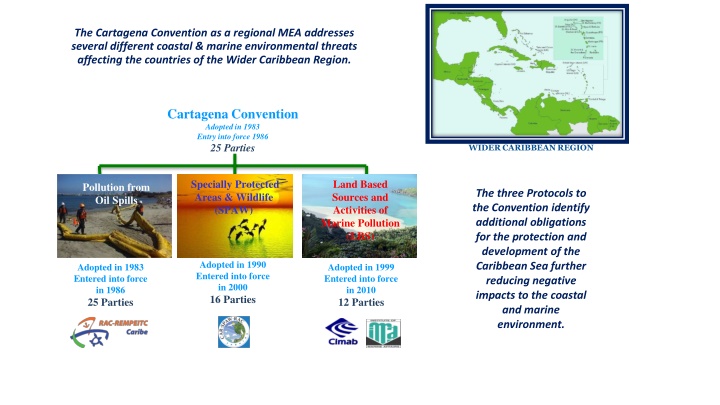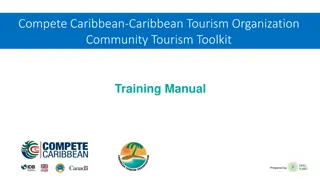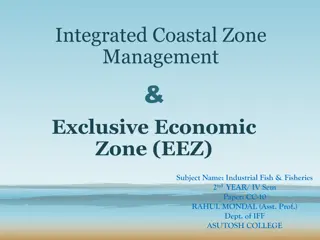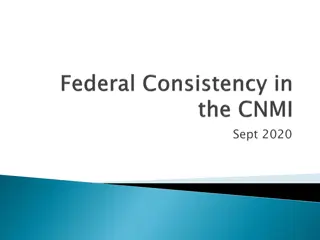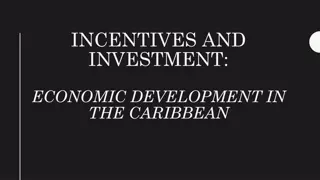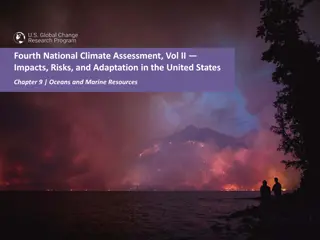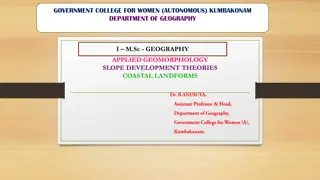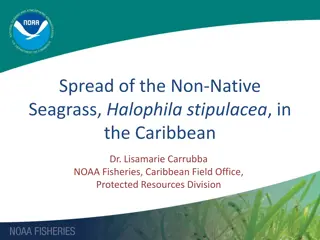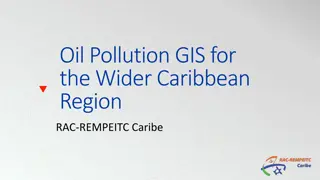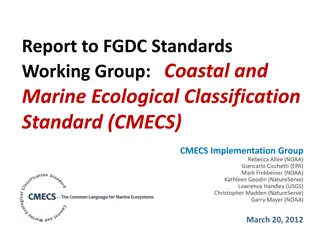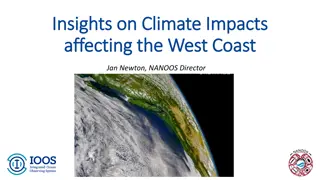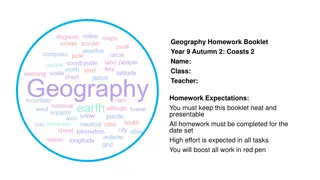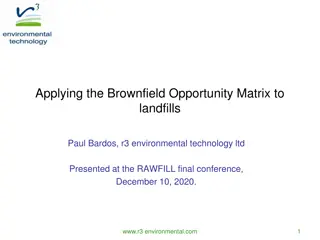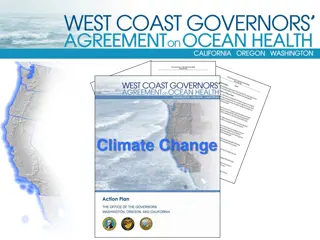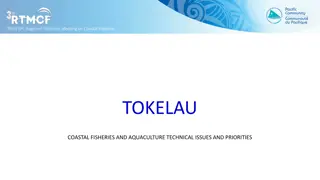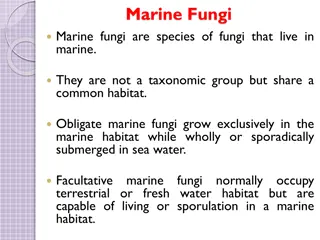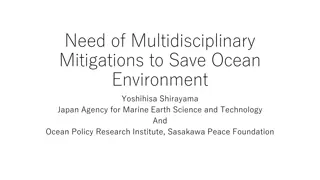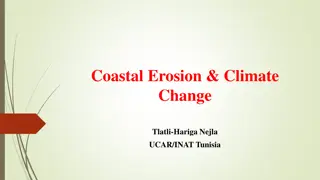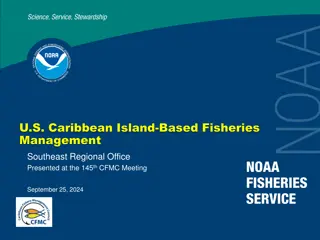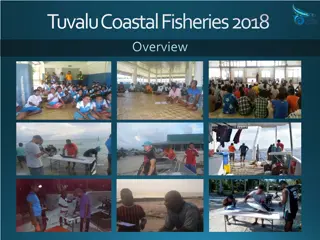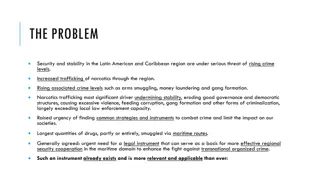Addressing Coastal and Marine Environmental Threats in the Wider Caribbean Region
The Cartagena Convention, along with its Protocols, aims to protect the coastal and marine environment in the Wider Caribbean Region by addressing issues such as marine pollution, oil spills, and wastewater management. The Convention emphasizes sustainable financing, institutional reforms, and enhancing awareness to mitigate negative impacts on the Caribbean Sea. Key achievements include investment in wastewater sector and improved regulatory frameworks.
Download Presentation

Please find below an Image/Link to download the presentation.
The content on the website is provided AS IS for your information and personal use only. It may not be sold, licensed, or shared on other websites without obtaining consent from the author.If you encounter any issues during the download, it is possible that the publisher has removed the file from their server.
You are allowed to download the files provided on this website for personal or commercial use, subject to the condition that they are used lawfully. All files are the property of their respective owners.
The content on the website is provided AS IS for your information and personal use only. It may not be sold, licensed, or shared on other websites without obtaining consent from the author.
E N D
Presentation Transcript
The Cartagena Convention as a regional MEA addresses several different coastal & marine environmental threats affecting the countries of the Wider Caribbean Region. Cartagena Convention Adopted in 1983 Entry into force 1986 25 Parties WIDER CARIBBEAN REGION Specially Protected Areas & Wildlife (SPAW) Land Based Sources and Activities of Marine Pollution (LBS) Pollution from Oil Spills The three Protocols to the Convention identify additional obligations for the protection and development of the Caribbean Sea further reducing negative impacts to the coastal and marine environment. Adopted in 1990 Entered into force in 2000 16 Parties Adopted in 1983 Entered into force in 1986 25 Parties Adopted in 1999 Entered into force in 2010 12 Parties
STATUS OF THE CARTAGENA CONVENTION & THE LBS PROTOCOL STATUS OF THE CARTAGENA CONVENTION & THE LBS PROTOCOL
Why GEF CReW? <20 % of wastewater produced is collected 85% enters Caribbean Sea untreated 0-30% access to centralized wastewater systems Health Nutrients Energy Irrigation Compost <10% in Latin America has secondary treatment By 2010 only 10 countries in the WCR had ratified LBS Protocol (Annex III) Benefits $ $
Improved legislative & policy frameworks Poor attitudes and low awareness of wastewater management Poor practices Low levels of enforcement Low levels of capacity Old infrastructure & technologies Country Antigua and Barbuda Aruba Bahamas Barbados Belize Colombia Cuba Dominican Republic Grenada Guatemala Guyana Haiti Jamaica Panama St. Lucia St. Vincent & the Grenadines Suriname Trinidad and Tobago Venezuela
What did we need? MONEY: Sustainable Financing Mechanisms REFORMS: Institutional, Policy & Legal Health Nutrients Energy Irrigation Compost AWARENESS: Knowledge Management, Sharing of Lessons, Capacity Building, Technologies Benefits $ $
Providing Investment in the Wastewater Sector through Sustainable Financing; Improved Institutional, Policy, Legal and Regulatory Environment; and Enhanced Knowledge and Awareness of Wastewater Related Issues Health Nutrients Energy Irrigation Compost Benefits $ $
Key Achievements - Wastewater featured at CWWA & HLF of Ministers - Model Templates: Policies & Action Plans - New & updated national policies, legislation & regulations - Wastewater Baseline Assessments in all countries - Over 400 persons trained - Media Sensitization & Increase in Media Coverage - New Partnerships Health Nutrients Energy Irrigation Compost Benefits $ $ Greater Awareness of LBS Protocol
Where are we now? Setting the Context for CReW+ LBS Protocol: 1. Ratification: Only Jamaica 2. Implementation: A&B, Pan. Slu, Guy, Bel Financing: 1. Still needed improved understanding by pilots of mechanisms 2. Broader approach & learning from Component 1 Reforms: 1. Regional Tools developed but now have to be used at national level 2. Some reforms at national level - Antigua, St. Lucia, Guyana, Jamaica 3. Training: More is still needed but targeted & institutionalized Health Nutrients Energy Irrigation Compost Benefits $ $
Rio20+ stressed the urgent need to adopt measures to significantly reduce water pollution & increase water quality, significantly improve wastewater treatment, water efficiency & reduce water losses & reuse treated wastewater (UN Water, 2014) Health Nutrients Energy Irrigation Compost Benefits $ $
Health Nutrients Energy Irrigation Compost Benefits $ $
Health Nutrients Energy Irrigation Compost Benefits $ $
Objective of CReW+ Implementing and Upscaling Wider Caribbean-specific Financial Mechanisms that enable the use of Integrated and Innovative Solutions for Water and Wastewater Management and reflect concerns of Climate Change and Variability Health Nutrients Energy Irrigation Compost Benefits $ $
Structure of CReW+ Component 1: Appropriate & Sustainable Financing Mechanisms Component 2: Enabling conditions at country and community level to plan, implement & manage wastewater management solutions Component 3: National & Community Based Solutions (Appropriate & Innovative) Component 4: Knowledge Management & Advocacy Components 5 & 6: Monitoring & Evaluation and Project Management Health Nutrients Energy Irrigation Compost Benefits $ $ UNEP, IDB, UNEP CAR/RCU, CDB, CARPHA and others?
Component 1 - Outcomes Appropriate & sustainable financing mechanisms for innovative and integrated solutions to water/wastewater management Operational Investment strategies & action plans for wastewater management including chemicals in wastewater Health Nutrients Energy Irrigation Compost Increased awareness and knowledge of financing approaches for national & regional upscaling Benefits $ $
Component 1 Outputs Appropriate & sustainable financing mechanisms for innovative and integrated solutions to water/wastewater management Inventory of Financing Options Health Nutrients Rural/Community Specific Financing Action Plans Energy Irrigation Compost Country specific Business models for financing wastewater investments (making the business case) Benefits $ $ Under financing - What else is needed?
Component 2 - Outcomes Strengthening the enabling conditions of countries & communities to plan, manage & implement wastewater management solutions/interventions Improved capacity to design, develop & implement Wastewater Strategies & Action Plans Improved capacity to integrate wastewater into National Development Plans Increased capacity to implement innovative treatment approaches e.g. wetlands at community & national levels Health Nutrients Energy Irrigation Compost Benefits $ $
Component 2 Outputs Strengthening the enabling conditions of countries & communities to plan, manage & implement wastewater management solutions/interventions Development/Institutionalization of training material 1. Monitoring & Analysis 2. Chemicals & emerging pollutants in effluent Regional pool of experts to provide ongoing support Standards, Criteria re-use of wastewater as resource, chemical contaminants in wastewater, enforcement of regulations & standards Health Nutrients Energy Irrigation Compost Benefits $ $ Under training - What else is needed?
Component 3 - Outcomes National & Community Based Solutions Implementation of appropriate & sustainable water use, wastewater treatment, reuse technologies & practices IWRM & LBS Protocol at community, local & national levels Health Nutrients Energy Irrigation Compost Local Experiences incorporated into national development strategies and plans vulnerability to climate change and use of wastewater as a resource Benefits $ $
Component 3 Outputs Appropriate & sustainable financing mechanisms for innovative and integrated solutions to water/wastewater management Review & Identify site specific wastewater management solutions Develop criteria for governance & sustainability of proposed interventions Develop Sustainable Management Plans Design & implement cost-effective, technology appropriate, culturally acceptable solutions Local & national upscaling/replicating of plans Health Nutrients Energy Irrigation Compost Benefits $ $ What type of community projects?
Component 4 - Outcomes Knowledge Management & Advocacy: Promoting Sustainable Development Goals, Human Right to Water, Incentives, Water Security & Technical Standards Improved awareness & understanding by multiple stakeholders Health Nutrients Energy Irrigation Compost Compiled knowledge & experiences shared with other projects Benefits $ $
Component 4 Outputs Knowledge Management & Advocacy: Promoting Sustainable Development Goals, Human Right to Water, Incentives, Water Security & Technical Standards Communication Strategies Stakeholder Analysis e.g. Wastewater as a resource Briefing Publications for specific target groups Free Open Online Courses (MOOC at regional level) Guidance documents on specific aspects of wastewater e.g. use of biosolids, water reuse Professional/Technical Exchanges Health Nutrients Energy Irrigation Compost Benefits $ $ How else can we improve awareness?
Questions? Are we on the right track Scope? What should we add or remove? Health Nutrients Energy Irrigation Compost What are your national priorities for Wastewater Management? Benefits $ $
THANK YOU! United Nations Environment Programme Caribbean Environment Programme 14-20 Port Royal Street, Kingston, Jamaica Tel: +876-922-9267; Fax: +876-922-9292 Health Nutrients Energy Irrigation Compost Websites: www.cep.unep.org www.gefcrew.org Benefits $ $ Facebook: UNEP-Caribbean Environment Programme Twitter: @UNEP_CEP
